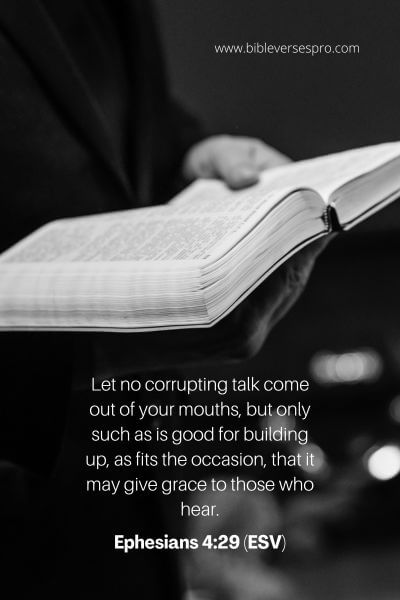Many people hold contrasting views when it comes to criticizing pastors.
While some people think that giving pastors constructive criticism might help them get better, others think it can actually hurt and be rude.
The Bible does offer some advice on this subject, though. We will look at Bible verses about criticizing pastors, including when it is appropriate and when it is not, in this post.
For individuals who are battling this issue in their own life, these passages might provide insightful and helpful viewpoints.
What Does The Bible Say About Talking Bad About Pastors?
The Bible contains several passages that speak to the issue of speaking negatively about pastors or other spiritual leaders.
While the exact wording may differ depending on the translation, the underlying message remains consistent: speaking negatively about spiritual leaders is harmful and displeasing to God.
(1 Timothy 5:19) Paul writes, “Do not entertain an accusation against an elder unless it is brought by two or three witnesses.”
This verse suggests that accusations against pastors or spiritual leaders should not be taken lightly, and should only be made after careful consideration and verification.
(James 3:1) it is written, “Not many of you should become teachers, my fellow believers, because you know that we who teach will be judged more strictly.”
This verse reminds us of the high standards to which pastors and spiritual leaders are held, and suggests that we should not be quick to judge or criticize those who have taken on this important responsibility.
(Ephesians 4:29) warns against using negative or harmful language, stating, “Do not let any unwholesome talk come out of your mouths, but only what is helpful for building others up according to their needs, that it may benefit those who listen.”
This verse reminds us that our words have the power to build up or tear down, and encourages us to speak in ways that are constructive and beneficial.
Finally, the Bible teaches us that speaking negatively about pastors or other spiritual leaders is harmful not only to the individuals involved, but also to the broader community of believers.
By striving to speak with kindness, respect, and love, we can build up our communities and deepen our connection to God’s word.
How Should A Pastor Handle Criticism
As a spiritual leader, pastors may face criticism from their congregations, colleagues, or others in their community. While receiving criticism can be difficult, there are several ways in which pastors can handle these situations with grace and wisdom.
First and foremost, it is important for pastors to approach criticism with humility and an open mind. Instead of becoming defensive or dismissive, pastors should listen carefully to the concerns being raised, and consider whether there is any truth or validity to the criticism.
In addition, pastors can benefit from seeking out constructive feedback and input from trusted colleagues or mentors. By being open to constructive criticism and seeking out opportunities for growth and learning, pastors can become more effective in their role as spiritual leaders.
Another important aspect of handling criticism is maintaining healthy boundaries and managing expectations. While pastors may feel a sense of responsibility to please everyone, it is important to recognize that this is not always possible or realistic. By setting clear expectations and boundaries, pastors can manage their own stress and maintain a healthy work-life balance.
Finally, it is important for pastors to maintain a strong sense of faith and connection to God’s word. By drawing on the teachings of the Bible and staying rooted in their faith, pastors can find strength and guidance in difficult times, and can lead their congregations with confidence and integrity.
In summary, handling criticism can be a challenging aspect of pastoral leadership, but it is an important opportunity for growth and learning. By approaching criticism with humility, seeking out constructive feedback, maintaining healthy boundaries, and staying connected to their faith, pastors can navigate these situations with wisdom and grace.
Bible Verses About Criticizing Pastors
The role of pastors and spiritual leaders in the Christian community is a crucial one, as they serve as shepherds and guides for their congregations.
However, pastors may also be subject to criticism and negative feedback from members of their community.
While it is important for congregants to hold their pastors accountable and provide constructive feedback, the Bible also contains several verses that caution against speaking negatively or unfairly about spiritual leaders.
In this content, we will explore some of these verses and reflect on what they teach us about how we should approach the issue of criticizing pastors.
Ephesians 4:29 (ESV) – Be Mindful Of What You Say
Let no corrupting talk come out of your mouths, but only such as is good for building up, as fits the occasion, that it may give grace to those who hear.

Romans 12:3 (ESV) – The Grace Is Given To Everyone
For by the grace given to me I say to everyone among you not to think of himself more highly than he ought to think, but to think with sober judgment, each according to the measure of faith that God has assigned.

James 5:16 (ESV) – Confess Your sins
Therefore, confess your sins to one another and pray for one another, that you may be healed. The prayer of a righteous person has great power as it is working.

3 John 1:9-10 (ESV) Acknowledge Your Leaders
I have written something to the church, but Diotrephes, who likes to put himself first, does not acknowledge our authority. So if I come, I will bring up what he is doing, talking wicked nonsense against us. And not content with that, he refuses to welcome the brothers, and also stops those who want to and puts them out of the church.

Luke 24:25-26 (ESV) – Listen To The Word Of God
And he said to them, “O foolish ones, and slow of heart to believe all that the prophets have spoken! Was it not necessary that the Christ should suffer these things and enter into his glory?”

2 Corinthians 6:14 (ESV) – Live A righteous Life
Do not be unequally yoked with unbelievers. For what partnership has righteousness with lawlessness? Or what fellowship has light with darkness?

Luke 22:26 (ESV) – A Leader Is The One Who Serves
But not so with you. Rather, let the greatest among you become as the youngest, and the leader as one who serves.

Matthew 23:23-24 (ESV) Carry Everyone Alone
“Woe to you, scribes and Pharisees, hypocrites! For you tithe mint and dill and cumin, and have neglected the weightier matters of the law: justice and mercy and faithfulness. These you ought to have done, without neglecting the others. You blind guides, straining out a gnat and swallowing a camel!

John 14:6 (ESV) – Christ Is The Way
Jesus said to him, “I am the way, and the truth, and the life. No one comes to the Father except through me.

1 Timothy 2:5 (ESV) Christ Is our Mediator
For there is one God, and there is one mediator between God and men, the man Christ Jesus,

John 8:1-11 (ESV) – Do Not Judge
But Jesus went to the Mount of Olives. Early in the morning he came again to the temple. All the people came to him, and he sat down and taught them. The scribes and the Pharisees brought a woman who had been caught in adultery, and placing her in the midst they said to him, “Teacher, this woman has been caught in the act of adultery. Now in the Law, Moses commanded us to stone such women. So what do you say?” …
Luke 13:15-16 (ESV)
Then the Lord answered him, “You hypocrites! Does not each of you on the Sabbath untie his ox or his donkey from the manger and lead it away to water it? And ought not this woman, a daughter of Abraham whom Satan bound for eighteen years, be loosed from this bond on the Sabbath day?”
Matthew 23:15 (ESV)
Woe to you, scribes and Pharisees, hypocrites! For you travel across sea and land to make a single proselyte, and when he becomes a proselyte, you make him twice as much a child of hell as yourselves.
Matthew 16:23 (ESV)
But he turned and said to Peter, “Get behind me, Satan! You are a hindrance to me. For you are not setting your mind on the things of God, but on the things of man.”
Isaiah 55:1-13 (ESV)
“Come, everyone who thirsts, come to the waters; and he who has no money, come, buy and eat! Come, buy wine and milk without money and without price. Why do you spend your money for that which is not bread, and your labor for that which does not satisfy? Listen diligently to me, and eat what is good, and delight yourselves in rich food.
Incline your ear, and come to me; hear, that your soul may live; and I will make with you an everlasting covenant, my steadfast, sure love for David. Behold, I made him a witness to the peoples, a leader and commander for the peoples. Behold, you shall call a nation that you do not know, and a nation that did not know you shall run to you, because of the Lord your God, and of the Holy One of Israel, for he has glorified you. …
Proverbs 22:6 (ESV)
Train up a child in the way he should go; even when he is old he will not depart from it.
2 Chronicles 6:30 (ESV)
Then hear from heaven your dwelling place and forgive and render to each whose heart you know, according to all his ways, for you, you only, know the hearts of the children of mankind,
Deuteronomy 7:1-6 (ESV)
“When the Lord your God brings you into the land that you are entering to take possession of it, and clears away many nations before you, the Hittites, the Girgashites, the Amorites, the Canaanites,
the Perizzites, the Hivites, and the Jebusites, seven nations more numerous and mightier than you, and when the Lord your God gives them over to you, and you defeat them, then you must devote them to complete destruction.
You shall make no covenant with them and show no mercy to them. You shall not intermarry with them, giving your daughters to their sons or taking their daughters for your sons, for they would turn away your sons from following me, to serve other gods.
Then the anger of the Lord would be kindled against you, and he would destroy you quickly. But thus shall you deal with them: you shall break down their altars and dash in pieces their pillars and chop down their Asherim and burn their carved images with fire. …
Acts 15:10 (ESV)
Now, therefore, why are you putting God to the test by placing a yoke on the neck of the disciples that neither our fathers nor we have been able to bear?
Mark 7:8 (ESV)
You leave the commandment of God and hold to the tradition of men.”
Matthew 23:34 (ESV)
Therefore I send you prophets and wise men and scribes, some of whom you will kill and crucify, and some you will flog in your synagogues and persecute from town to town,
Matthew 23:6-7 (ESV)
And they love the place of honor at feasts and the best seats in the synagogues and greetings in the marketplaces and being called rabbi by others.
Matthew 23:1-3 (ESV)
Then Jesus said to the crowds and to his disciples, “The scribes and the Pharisees sit on Moses’ seat, so do and observe whatever they tell you, but not the works they do. For they preach, but do not practice.
Matthew 19:1-30 (ESV)
Now when Jesus had finished these sayings, he went away from Galilee and entered the region of Judea beyond the Jordan. And large crowds followed him, and he healed them there. And Pharisees came up to him and tested him by asking, “Is it lawful to divorce one’s wife for any cause?”
He answered, “Have you not read that he who created them from the beginning made them male and female, and said, ‘Therefore a man shall leave his father and his mother and hold fast to his wife, and the two shall become one flesh’? …
Matthew 16:12 (ESV)
Then they understood that he did not tell them to beware of the leaven of bread, but of the teaching of the Pharisees and Sadducees.
Matthew 16:6 (ESV)
Jesus said to them, “Watch and beware of the leaven of the Pharisees and Sadducees.”
Matthew 5:18 (ESV)
For truly, I say to you, until heaven and earth pass away, not an iota, not a dot, will pass from the Law until all is accomplished.
Ezekiel 34:4 (ESV)
The weak you have not strengthened, the sick you have not healed, the injured you have not bound up, the strayed you have not brought back, the lost you have not sought, and with force and harshness you have ruled them.
Ezekiel 34:1-6 (ESV)
The word of the Lord came to me: “Son of man, prophesy against the shepherds of Israel; prophesy, and say to them, even to the shepherds, Thus says the Lord God: Ah, shepherds of Israel who have been feeding yourselves! Should not shepherds feed the sheep? You eat the fat, you clothe yourselves with the wool, you slaughter the fat ones, but you do not feed the sheep.
The weak you have not strengthened, the sick you have not healed, the injured you have not bound up, the strayed you have not brought back, the lost you have not sought, and with force and harshness you have ruled them. So they were scattered, because there was no shepherd, and they became food for all the wild beasts. My sheep were scattered; …
2 Samuel 5:2 (ESV)
In times past, when Saul was king over us, it was you who led out and brought in Israel. And the Lord said to you, ‘You shall be shepherd of my people Israel, and you shall be prince over Israel.’”
Deuteronomy 11:19 (ESV)
You shall teach them to your children, talking of them when you are sitting in your house, and when you are walking by the way, and when you lie down, and when you rise.
Jude 1:3 (ESV)
Beloved, although I was very eager to write to you about our common salvation, I found it necessary to write appealing to you to contend for the faith that was once for all delivered to the saints.
2 Timothy 3:16 (ESV)
All Scripture is breathed out by God and profitable for teaching, for reproof, for correction, and for training in righteousness,
Galatians 6:12-13 (ESV)
It is those who want to make a good showing in the flesh who would force you to be circumcised, and only in order that they may not be persecuted for the cross of Christ. For even those who are circumcised do not themselves keep the law, but they desire to have you circumcised that they may boast in your flesh.
Galatians 2:12 (ESV)
For before certain men came from James, he was eating with the Gentiles; but when they came he drew back and separated himself, fearing the circumcision party.
Galatians 2:4 (ESV)
Yet because of false brothers secretly brought in—who slipped in to spy out our freedom that we have in Christ Jesus, so that they might bring us into slavery—
2 Corinthians 11:16-23 (ESV)
I repeat, let no one think me foolish. But even if you do, accept me as a fool, so that I too may boast a little. What I am saying with this boastful confidence, I say not as the Lord would but as a fool. Since many boast according to the flesh, I too will boast. For you gladly bear with fools, being wise yourselves! For you bear it if someone makes slaves of you, or devours you, or takes advantage of you, or puts on airs, or strikes you in the face.
Conclusion
The Bible offers important guidance for how we should approach the issue of criticizing pastors and other spiritual leaders.
While it is important for congregants to hold their leaders accountable and provide constructive feedback, the Bible also cautions against speaking negatively or unfairly about spiritual leaders.
By approaching criticism with humility, seeking out constructive feedback, maintaining healthy boundaries, and staying connected to their faith, pastors can navigate these situations with wisdom and grace.
At the same time, congregants can learn to provide feedback in a respectful and constructive way, recognizing the important role that pastors play in guiding and shepherding their community.
By striving to embody the principles of love, kindness, and respect, we can build strong, healthy communities of faith that reflect the values of the Bible and honor the important work of our pastors and spiritual leaders.







